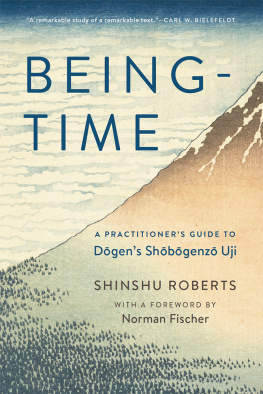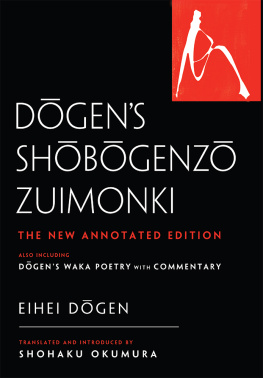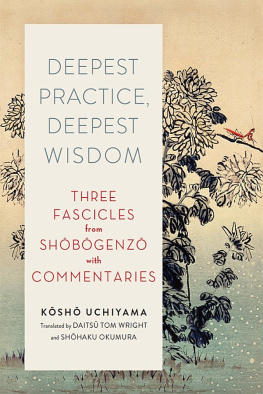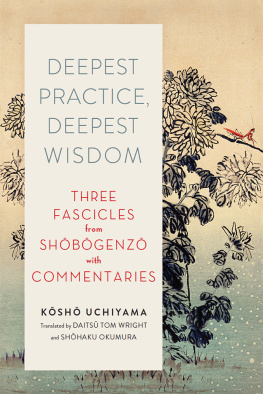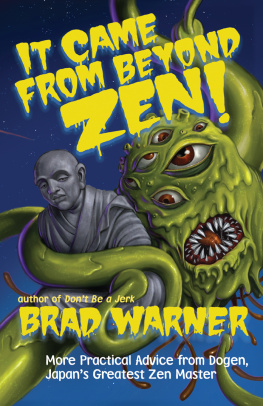
Wisdom Publications
199 Elm Street
Somerville, MA 02144 USA
www.wisdompubs.org
2018 Leilani Shinshu Roberts
All rights reserved.
No part of this book may be reproduced in any form or by any means, electronic or mechanical, including photography, recording, or by any information storage and retrieval system or technologies now known or later developed, without permission in writing from the publisher.
Library of Congress Cataloging-in-Publication Data
Names: Roberts, Shinshu, author.
Title: Being-time: a practitioners guide to Dgens Shbgenz Uji / Shinshu Roberts.
Description: Somerville: Wisdom Publications, 2018. | Includes bibliographical references and index. |
Identifiers: LCCN 2017018053 (print) | LCCN 2017058164 (ebook) | ISBN 9781614291381 (ebook) | ISBN 1614291381 (ebook) | ISBN 9781614291138 (pbk.: alk. paper) | ISBN 1614291136 (pbk.: alk. paper)
Subjects: LCSH: Dgen, 12001253. Shb genz. | Spiritual life Stsh. | Stsh Doctrines.
Classification: LCC BQ9449.D654 (ebook) | LCC BQ9449.D654 S5337325 2018 (print) | DDC 294.3/85 dc23
LC record available at https://lccn.loc.gov/2017018053
ISBN 978-1-61429-113-8 ebook 978-1-61429-138-1
21 20 19 18 5 4 3 2 1
Cover design by Jess Morphew.
Interior design by Gopa & Ted2, Inc.
Day and night
Night and day,
The way of Dharma as everyday life;
In each act our hearts
Resonate with the call of the stra.
EIHEI DGEN
Foreword

OF ALL THE many important interlocking concepts that comprise basic Buddhist teaching, none is more important than impermanence. The four noble truths suffering, cause of suffering, end of suffering, and path flow from it. We suffer because everything is impermanent, everything ends, loss is inevitable. This is the inescapable human condition the path is set forth to address.
But a more detailed look at Buddhist teachings on impermanence, especially Mahyna teachings, changes the initial impression. Impermanence, it becomes clear, doesnt mean that things last for a while then pass away: things arise and pass away at the same time . That is, things dont exist as we imagine they do. Much of our experience of reality is illusory. And this is why we suffer.
In effect, what these teachings are telling us is that impermanence is time itself, being itself, and that time and being are not at all as we imagine them to be, they are utterly otherwise. To really understand and fully embrace this point is to live in a radically different world a world of awakening, inclusion, and love. Time is the lock and the key! to Buddhist teachings, and to our lives.
As far as I am aware, Dgen is the only Buddhist teacher who frames the teaching on impermanence explicitly as a teaching about time. And just as for Buddha impermanence is central, so for Dgen time is the central conception of the whole of his thought. All of Dgens profoundly poetic teachings flow from his seminal understanding of time, as expressed in Uji (Being-Time), his famous (and famously difficult) essay in his masterwork, Shbgenz.
In Uji, Dgen teaches that time itself, being itself, is luminous awakening. It is all-inclusive, all-elusive, ultimately healing, and eternal. Clearly, there is much to ponder here. Yet Uji is only a few short pages in length. These pages, and this teaching, is the subject of the sturdy and detailed volume you now have in your hands.
Zen is famous for advocating direct experience and intense meditation. Traditionally and this is still true in many Zen places study is not only discouraged, it is forbidden. But in our St Zen tradition, following Dgen, study is prized, not necessarily for the knowledge it provides but as an important component in spiritual practice. Shinshu Roberts, a St Zen priest of long experience, has, from the beginning of her practice, valued and prized study as a primary gate for entry into the realms of faith and illumination. This book is the fruit of her many years of practicing this.
Dgens works (and Uji is perhaps typical of them) are inspirational. But their inspiration doesnt come without some effort. Noted for the density and multifaceted nature of their presentation, Dgens works require serious study.
In this text Shinshu does full justice, as no other book I know of, to Dgens words. She offers interpretation only after careful consideration and marshaling of many sources. She offers simple everyday examples to illustrate points that seem at first abstruse. As a priest working closely with contemporary Zen students, she never loses sight of the fact that Dgens teachings are intended to be put into practice in daily living, not merely studied and discussed. I am truly impressed by the thoroughness, intensity, love, and faith that Shinshu has put into this book.
Allow me to suggest to the reader a way to proceed. Do not read this text as you ordinarily read, going along at a steady pace, with the assumption that you will understand what is being said. Instead, take your time. Go slow. Ponder. Read repeatedly the many quotations from Dgen cited (not only from Uji, but from many other related texts). Perhaps write them down. Dont try too hard to understand. Let the words seep in, echo. Be willing not to understand. Be willing to feel the uncomfortable feeling that perhaps what you think you know, even fundamentally know, about your life isnt right. Be willing to marvel at this feeling, even affirm it, and not to insist that it go away. Be amazed.
If this text causes you to doubt your most cherished concepts about your life, it will have done its work.
NORMAN FISCHER is the spiritual director of the Everyday Zen Foundation, and a former abbot of the San Francisco Zen Center. Hes also the author of numerous books on Zen, religion, and writing.
Preface

I RELIED PRIMARILY upon scholarly articles, glossaries, and translation footnotes to ascertain the basic meaning of the text. Practicing with the material arose from my own exploration and reading the few practice commentaries on parts of Uji, such as Dainin Katagiri Roshis book Each Moment Is the Universe .
As much as possible I have tried to grasp what Dgen means, not what I think he might mean. When reading Dgen, we must be careful to avoid the tendency to translate what we do not understand into something we already understand. For instance, we might be tempted to categorize everything as the doctrine of form and emptiness, or the relative and absolute. If we applied that logic to being-time, we would not see the vast scope of Dgens vision.
Since I do not read Japanese, I depended, in part, upon the interpretation of others. Included in this process was finding various translations of the same word or phrase in more than one fascicle of the Shbgenz or another text by Dgen, such as his collection of three hundred kans or the Eihei Kroku. Several of Dgens books have excellent translations in English.
Because Dgens original texts do not conform to modern textual divisions, even the scholar must make translation decisions based upon his or her understanding of the meaning the text. Dgen did not write paragraphs or stress delineations between ideas. When we read a translation divided into paragraphs, those divisions are the translators choice, not Dgens. Translators sometimes omit arcane references by translating them into a more palatable form. One such example would be transforming the phrase one hundred grasses into myriad things.
Next page
